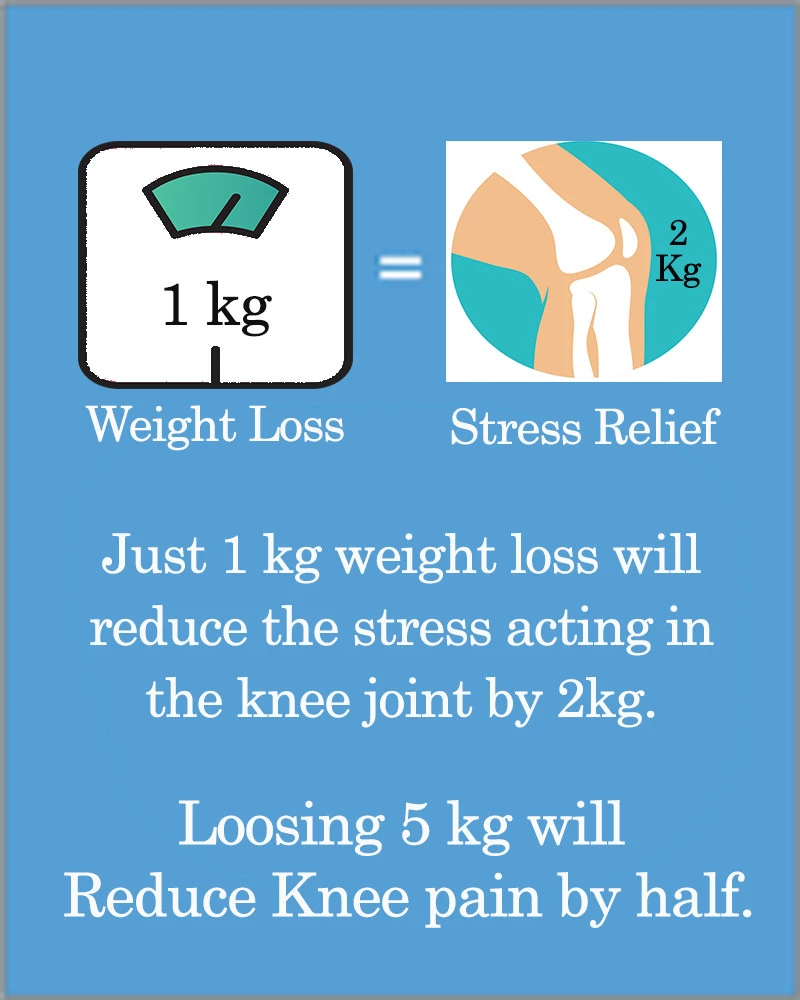
Knee problems and back pain are common in overweight. Reducing weight can help relieve pain and lessen the risk of osteoarthritis.
Some of the common problems due to obesity are:
- Knee problem (Arthritis)
- Hip pain
- Back Pain (Spondylosis)
- Diabetes (How diabetes affect Bones)
- High Blood pressure
- Sleep Apnea
- Plantar Fasciitis
Each Kilogram lost reduces the stress in your knees by 2 kg. On losing 5 kg weight, your knees will sustain 20 Kg less strain in each step reducing the chance of knee problems and arthritis by 50%.

Scientifically proven ways to Lose Weight
While there are many diets, pills, and meal replacement plans claiming to help you lose weight quickly, the majority of them are not effective and lack proper scientific evidence. Here are some of the best effective scientifically proven ways to lose weight.
1. Start with Protein breakfast
Protein can help people feel full by regulating appetite hormones. They help reduce the hunger hormone (ghrelin) and increase the satiety hormone (peptide YY, GLP-1, and cholecystokinin) and this lasts for several hours.
Eggs, oats, nut and seed butters, dal, quinoa porridge, sardines, and chia seed pudding are all high-protein breakfast options.
2. Mindful eating

People who practice mindful eating pay attention to how and where they eat their food. This method can help people enjoy their food while also maintaining a healthy weight.
As most people lead busy lives, they frequently eat on the run – in the car, at their workplaces, or while watching TV. As a result, many people are barely aware of the food they consume, and how they consume it.
Mindful eating techniques include:
1. Sit and Eat Comfortably
2. Pay attention to the food
3. Avoid Distractions (Turn off TV, laptops, and even Mobilephones)
4. Eat Slowly (Proper chewing and savoring of food)
3. Try Intermittent Fasting

Intermittent fasting (IF) is a technique that involves pre-planned fasting with small meal interval throughout the day. Several studies have proven that short-term intermittent fasting, which can last up to 24 weeks, has helped people lose weight.
The following are the most common Intermittent fasting methods:
- Fasting on alternate days.
- A new version is eating 25–30% of the body’s energy demands, on fasting days.
- The 2/5 weekly Diet: Fasting for two days every week. Eat 500–600 calories on fasting days.
- The 16/8 Daily Diet: Fasting for 16 hours and only eating for 8 hours. The 8-hour time-frame for most people is from noon (12 pm) to 8 pm.
4. Tracking your Diet and Exercise
Keep track of what you eat and drink on a daily basis. The most efficient method to do this is to have a food journal or an online meal tracker.
There were 3.7 billion health app downloads in the year 2021. Diet, physical activity, and weight loss applications were among the most popular of these. This is not without cause, as keeping track of physical activity and weight loss progress can be a useful tool for weight management.
Some of the best tracking apps include: MyPlate Calorie Counter, PlateJoy, MyFitnessPal, Lifesum: Healthy Eating.
Checkout this article for more information.

5. Less Sugars and Refined Carbs
Our diet is becoming increasingly rich in added sugars, which causes to obesity. Refined carbs such as White rice, bread, and pasta are processed and stripped of fiber and other nutrients. These foods are easy to digest and convert quickly to glucose. Excess glucose in the blood causes the hormone insulin to be released, which encourages fat storage in the adipose tissue causing weight gain.
Replace processed and sugary foods with healthier alternatives wherever possible. Food swaps that are advised include:
- Whole-grain rice, bread, and pasta instead of the white versions
- Fruit, nuts, and seeds instead of high-sugar snacks
- Herb teas and fruit-infused water instead of high-sugar sodas
- Smoothies with water or milk instead of fruit juice
6. Have lots of Fibers
Unlike sugar and starch, dietary fiber is a type of plant-based carbohydrate that cannot be digested in the small intestine. Incorporating a high-fiber diet into one’s diet might boost one’s sense of fullness, potentially contributing to satiety and weight loss.
Foods high in fiber include: Oats, barley, and rye fruit and vegetables, whole-grain morning cereals, whole-wheat pasta, whole-grain bread, oats, barley, and rye nuts and seeds peas, beans, and pulses
Click here for 10 Healthy Food for Good Bone Life
7. Gut Bacteria
Recent research has proven the beneficial effects of good bacteria in weight management. The human gut is home to a diverse range of microorganisms, including approximately 37 trillion bacteria. Good bacteria in the gut can be increased by eating certain types of foods, such as:
- Fermented foods help good bacteria function better while preventing the growth of bad bacteria. Curd and Yoghurt are rich in good bacteria and research-proven to aid in weight loss.
- Some Plants Variety: Fruits, vegetables, and grains have high fiber content and probiotic bacteria. They should make up at least 75 percent of a person’s meal.
- Prebiotic foods encourage the growth and activity of good bacteria that help with weight control. Many fruits and vegetables, particularly chicory root, artichoke, onion, garlic, asparagus, leeks, banana, and avocado, contain prebiotic fiber. It’s also found in grains like oats and barley
8. Water Exercise

Water exercises are a great way to lose weight while nourishing your joints. Swimming, water aerobics, and pool walking are good options for individuals with joint pain and arthritis.
As your body floats in water, you remove a lot of the weight of your joints making them less painful. Water also offers resistance, allowing you to engage muscles without putting strain on your joints thereby using more calories with less strain. Consider hitting the pool at least once a month.
Check out our Home Exercise page to practice Weight losing exercise from home.
9. Stress Management
Stress triggers the release of hormones like adrenaline and cortisol, which initially suppress hunger. However constant stress and tension affect cortisol function to increase hunger and appetite leading to overeating.
Researchers discovered that starting a Stress-management program for 8 weeks resulted in a significant reduction in the body mass index (BMI) of overweight individuals.
Some of the stress-management techniques are:
- Breathing and relaxation exercises
- Yoga, Meditation, or Tai chi.
- Spending time outside, such as walking or gardening
Check out our article Tai-chi for Beginners to learn Tai-chi meditation in 5 minutes.


10. Good night Sleep
Getting less than 5–6 hours of sleep every night has proven to have increased weight gain in numerous studies.
Poor-quality sleep lowers your metabolism causing your body to retain excess energy as fat. In addition, lack of sleep increases the synthesis of insulin and cortisol, both of which increase fat storage. Inconsistent sleep cycle affects the appetite-controlling hormones (ghrelin) causing increased hunger.
End-note from SUNDARSPINE
“The majority of your weight is supported by joints in your lower body, particularly your knees and hips. Carrying extra weight for years causes painful and stiff joints. Losing weight is an important part of treating the consequences of osteoarthritis and back problems. By reducing weight, you have won half the battle against Arthritis and Back Pain.”
Consultant Orthopaedic and Spine Surgeon-Specialist
